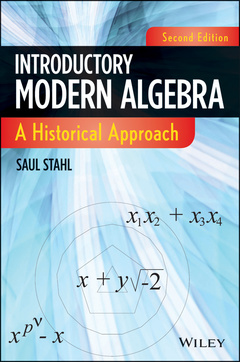Description
Introductory Modern Algebra (2nd Ed.)
A Historical Approach
Author: Stahl Saul
Language: English
Subjects for Introductory Modern Algebra:
Keywords
algebra, modern algebra, math history, RSA algorithm, logic, proof, sets, functions, equivalence relations, prime factorizations, Sylow theory, complex numbers, solutions of equations, modular arithmetic, binomial theorem, modular powers, rings and fields, polynomials, Galois, galois fields, permutations, groups, quotient groups, elementary group theory
464 p. · 16.3x24.4 cm · Hardback
Description
/li>Contents
/li>Biography
/li>
"Stahl offers the solvability of equations from the historical point of view...one of the best books available to support a one-semester introduction to abstract algebra."
?CHOICE
Introductory Modern Algebra: A Historical Approach, Second Edition presents the evolution of algebra and provides readers with the opportunity to view modern algebra as a consistent movement from concrete problems to abstract principles. With a few pertinent excerpts from the writings of some of the greatest mathematicians, the Second Edition uniquely facilitates the understanding of pivotal algebraic ideas.
The author provides a clear, precise, and accessible introduction to modern algebra and also helps to develop a more immediate and well-grounded understanding of how equations lead to permutation groups and what those groups can inform us about such diverse items as multivariate functions and the 15-puzzle. Featuring new sections on topics such as group homomorphisms, the RSA algorithm, complex conjugation, the factorization of real polynomials, and the fundamental theorem of algebra, the Second Edition also includes:
- An in-depth explanation of the principles and practices of modern algebra in terms of the historical development from the Renaissance solution of the cubic equation to Dedekind's ideals
- Historical discussions integrated with the development of modern and abstract algebra in addition to many new explicit statements of theorems, definitions, and terminology
- A new appendix on logic and proofs, sets, functions, and equivalence relations
- Over 1,000 new examples and multi-level exercises at the end of each section and chapter as well as updated chapter summaries
Introductory Modern Algebra: A Historical Approach, Second Edition is an excellent textbook for upper-undergraduate courses in modern and abstract algebra.
Preface ix
1 The Early History 1
1.1 The Breakthrough 1
2 Complex Numbers 9
2.1 Rational Functions of Complex Numbers 9
2.2 Complex Roots 17
2.3 Solvability by Radicals I 23
2.4 Ruler and Compass Constructibility 26
2.5 Orders of Roots of Unity 36
2.6 The Existence of Complex Numbers* 38
3 Solutions of Equations 45
3.1 The Cubic Formula 45
3.2 Solvability by Radicals II 49
3.3 Other Types of Solutions* 50
4 Modular Arithmetic 57
4.1 Modular Addition, Subtraction, and Multiplication 57
4.2 The Euclidean Algorithm and Modular Inverses 62
4.3 Radicals in Modular Arithmetic* 69
4.4 The Fundamental Theorem of Arithmetic* 70
5 The Binomial Theorem and Modular Powers 75
5.1 The Binomial Theorem 75
5.2 Fermat's Theorem and Modular Exponents 85
5.3 The Multinomial Theorem* 90
5.4 The Euler φ-Function* 92
6 Polynomials Over a Field 99
6.1 Fields and Their Polynomials 99
6.2 The Factorization of Polynomials 107
6.3 The Euclidean Algorithm for Polynomials 113
6.4 Elementary Symmetric Polynomials* 119
6.5 Lagrange's Solution of the Quartic Equation* 125
7 Galois Fields 131
7.1 Galois's Construction of His Fields 131
7.2 The Galois Polynomial 139
7.3 The Primitive Element Theorem 144
7.4 On the Variety of Galois Fields* 147
8 Permutations 155
8.1 Permuting the Variables of a Function I 155
8.2 Permutations 158
8.3 Permuting the Variables of a Function II 166
8.4 The Parity of a Permutation 169
9 Groups 183
9.1 Permutation Groups 183
9.2 Abstract Groups 192
9.3 Isomorphisms of Groups and Orders of Elements 199
9.4 Subgroups and Their Orders 206
9.5 Cyclic Groups and Subgroups 215
9.6 Cayley's Theorem 218
10 Quotient Groups and their Uses 225
10.1 Quotient Groups 225
10.2 Group Homomorphisms 234
10.3 The Rigorous Construction of Fields 240
10.4 Galois Groups and Resolvability of Equations 253
11 Topics in Elementary Group Theory 261
11.1 The Direct Product of Groups 261
11.2 More Classifications 265
12 Number Theory 273
12.1 Pythagorean triples 273
12.2 Sums of two squares 278
12.3 Quadratic Reciprocity 285
12.4 The Gaussian Integers 293
12.5 Eulerian integers and others 304
12.6 What is the essence of primality? 310
13 The Arithmetic of Ideals 317
13.1 Preliminaries 317
13.2 Integers of a Quadratic Field 319
13.3 Ideals 322
13.4 Cancelation of Ideals 337
13.5 Norms of Ideals 341
13.6 Prime Ideals and Unique Factorization 343
13.7 Constructing Prime Ideals 347
14 Abstract Rings 355
14.1 Rings 355
14.2 Ideals 358
14.3 Domains 361
14.4 Quotients of Rings 367
A Excerpts: Al-Khwarizmi 377
B Excerpts: Cardano 383
C Excerpts: Abel 389
D Excerpts: Galois 395
E Excerpts: Cayley 401
F Mathematical Induction 405
G Logic, Predicates, Sets and Functions 413
G.1 Truth Tables 413
G.2 Modeling Implication 415
G.3 Predicates and their Negation 418
G.4 Two Applications 419
G.5 Sets 421
G.6 Functions 422
Biographies 427
Bibliography 431
Solutions to Selected Exercises 433
Index 440
Notation 444
SAUL STAHL, PhD, is Professor in the Department of Mathematics at the University of Kansas. In addition to authoring six previous books and more than thirty papers in the field of geometry, Dr. Stahl has twice been the recipient of the Carl B. Allendoerfer Award from the Mathematical Association of America.
These books may interest you

Introduction to Abstract Algebra 117.69 €



